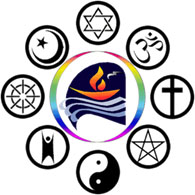What Is Unitarian Universalism?
Unitarian Universalism (UU) is a liberal religion—that is, a concept of religion that emphasizes rationality, a shared search for spiritual growth, and personal autonomy. We have more than one way of experiencing the world and understanding the sacred.
Seven Principles

UU congregations affirm and promote seven Principles as strong values and moral guides.
- 1st Principle: The inherent worth and dignity of every person;
- 2nd Principle: Justice, equity and compassion in human relations;
- 3rd Principle: Acceptance of one another and encouragement to spiritual growth in our congregations;
- 4th Principle: A free and responsible search for truth and meaning;
- 5th Principle: The right of conscience and the use of the democratic process within our congregations and in society at large;
- 6th Principle: The goal of world community with peace, liberty, and justice for all;
- 7th Principle: Respect for the interdependent web of all existence of which we are a part.
PBUUC adopted the proposed 8th Principle at our 2021 Annual Meeting.
- 8th Principle: We, the member congregations of the Unitarian Universalist Association, covenant to affirm and promote: journeying toward spiritual wholeness by working to build a diverse multicultural Beloved Community by our actions that accountably dismantle racism and other oppressions in ourselves and our institutions.
Six Sources
What we call our “Living Tradition” draws from six sources.
- Direct experience of that transcending mystery and wonder, affirmed in all cultures, which moves us to a renewal of the spirit and an openness to the forces which create and uphold life;
- Words and deeds of prophetic people which challenge us to confront powers and structures of evil with justice, compassion, and the transforming power of love;
- Wisdom from the world’s religions which inspires us in our ethical and spiritual life;
- Jewish and Christian teachings which call us to respond to God’s love by loving our neighbors as ourselves;
- Humanist teachings which counsel us to heed the guidance of reason and the results of science, and warn us against idolatries of the mind and spirit;
- Spiritual teachings of Earth-centered traditions which celebrate the sacred circle of life and instruct us to live in harmony with the rhythms of nature.
Explore these links to learn how Unitarian Universalists weave these traditions and identities into who they are today: Atheist and Agnostic, Buddhist, Christian, Earth-Centered, Hindu, Humanist, Jewish, Muslim.
The Unitarian Universalist Association (UUA) was formed in 1961 through the consolidation of the Universalist Church of America, established in 1793 and the American Unitarian Association, established in 1825.
